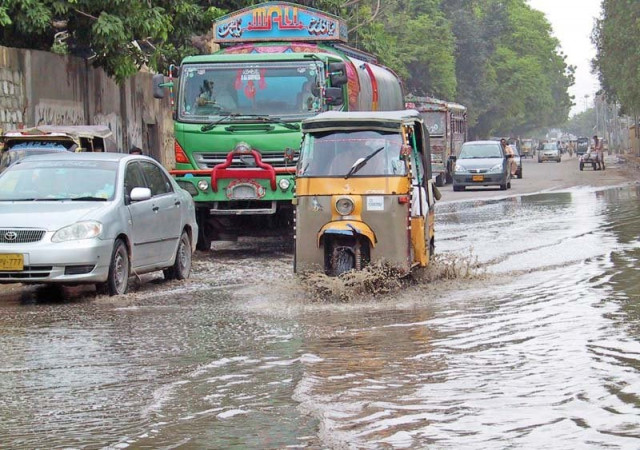Marred blessing: City braces for monsoon rains
Choked rainwater drains biggest source of accumulation of sewage water

Vehicles wade through water that accumulated at Garden Road after it rained in 2014. PHOTO: FILE
It's coming
The city is expected to receive its share of the overall monsoon rains occurring in the country this week.
Over all, the country is expected to receive 20% more rain compared to last year, according to the Pakistan Meteorological Department (PMD)’s seasonal forecast published on June 9.
The PMD has forwarded an advisory to all relevant government departments regarding the expected downpour, said Karachi Regional Meteorological Centre director Abdul Rashid.
Referring to Karachi, Rashid said apart from the monsoon rain, the city may also be hit by cyclones from the Indian Ocean and Arabian Sea accompanied with rain.
Pre-monsoon rains: CM sounds the alert on flood arrangements
The PMD has predicted that heavy rains may result in urban flooding in the metropolis. To counter the possible aftermath, a number of measures are being taken across the city.
Gearing up
Downpour in the metropolis is usually accompanied with power breakdowns and overflowing sewers.
The city's power utility, K-Electric, claims it has prepared a strategy to resume power to areas affected from rain with 'double back-up teams', according to Fakhar Ahmed, the marketing and communication chief at the company. Ahmed also advised citizens to follow standard safety rules during rain and call the K-Electric helpline in case of any emergency.
Accumulation of water and overflowing of sewers is also one of the major fallouts of rain. Karachi Water and Sewerage Board (KWSB) managing director Misbahuddin Farid said they have arranged alternative generators in case of power breakdowns at their pumping stations. He said the cleaning of garbage drains and blocked sewers [by the relevant department] would aid their efforts. Farid also requested citizens not to remove manholes in a bid to clear accumulated water as it makes matters worse since the gutters are then filled with substances that block the flow of sewage.
Monsoon rains set to hit Pakistan next week
The Cantonment Board Clifton's (CBC) rain emergency focal person Muhammad Farooq said their drains are clean and will likely hold in the face of intense rainfall.
The Provincial Disaster Management Authority has also issued directions to the relevant government departments in the city but the authority's spokesperson, Muhammad Shafi, did not share further details.
Fearing the spread of diseases, the health department too is all set to deal with the post-rain situation. Some of the common diseases that spread after rain are malaria, dengue, and gastroenteritis.
KMC health director Dr Ali Abbasi said the reason why these diseases spread is because rainwater is not drained properly and therefore stagnant water develops bacteria and dengue larva.
Abbasi added road accidents and deaths due to electrocution increase during rains.
He claimed that all necessary arrangements have been made and hospitals have been instructed to ensure sufficient supply of medicines and beds.
Earlier this week, health minister Mehtab Dahar ordered all hospitals of Sindh to remain on alert and cancelled holidays of medical staff.
KMC's preparations
According to Karachi Metropolitan Corporation (KMC) municipal services senior director Masood Alam, there are five major problems in the city's nullahs. He said that the menace of encroachment and no disposal of solid waste have destroyed the major nullahs, adding that the sewage flow is 100% in those drains. As for the public, he said, they regularly dispose of trash in these nullahs. "Daily, 8,000 tons of garbage is spilled in our drains," he pointed out, adding that they needed continuous efforts to clean those nullahs. Having them cleaned just before monsoon is of no use, he said.

Alam told The Express Tribune that there are as many as 28 drains that the KMC looks after. They fall in Lyari and Malir rivers, which eventually meet the sea.
According to Alam, the Soldier Bazaar, Orangi and Gujjar nullahs are being cleaned, which, he admitted, is just a short-term remedy. Even last year, the Gujjar nullah, which was cleared of the encroachment near Café Piyala, is again heavily encroached upon. Talking about the re-emergence of encroachments on this nullah, Alam was of the view that the solution was not sustainable and that wide roads should have been made on both sides of the drain once it was cleared so that the encroachment does not happen again. However, he said, they needed funds for that.
Apart from this, municipal health director Asghar Abbas shared that KMC administrates a total of 22 main arteries of the city, where they will deploy machinery to pump out rainwater. He said dewatering pumps will be placed at Liaquatabad Underpass, Ghareebabad Underpass, in front of the airport, at Natha Khan Bridge, near Nursery and Awami Markaz at Sharae Faisal as they have identified these as choking points.
Abbas added that they have the capacity to dispatch their machineries to 30 different locations of the city within an hour. He further said that fumigation will begin as soon as the rains stop.
Meanwhile, KMC administrator Laeeq Ahmed has already alerted the fire department and city wardens to carry out rescue works in case of emergencies. He has also directed the parks director to immediately start trimming of trees.
Published in The Express Tribune, June 27th, 2016.


















COMMENTS
Comments are moderated and generally will be posted if they are on-topic and not abusive.
For more information, please see our Comments FAQ